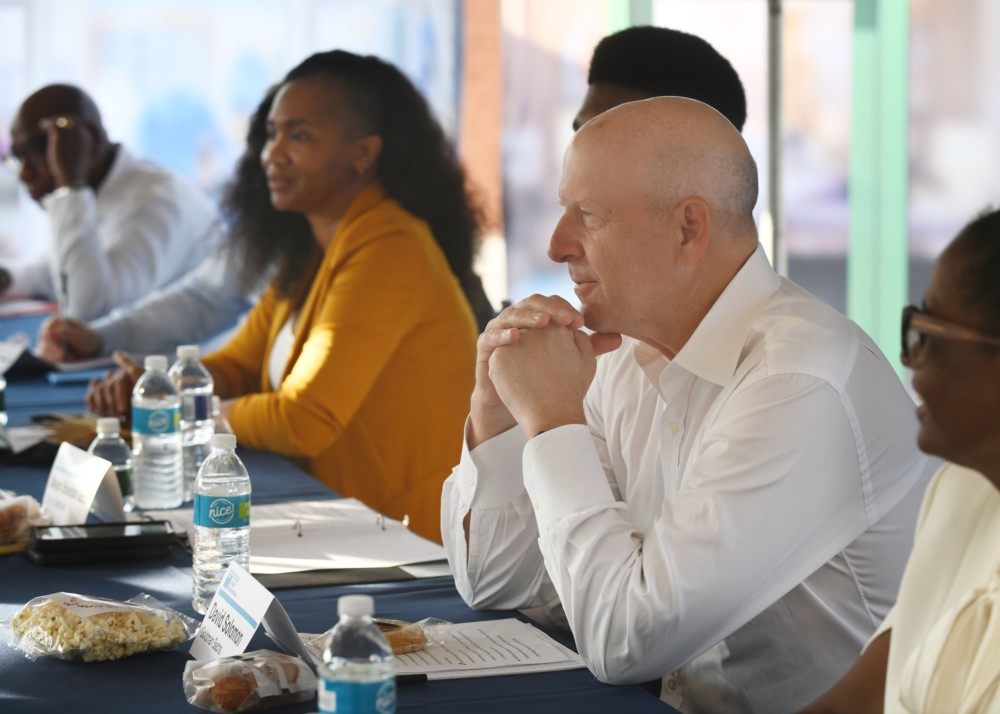Lorraine Mirabella
Baltimore Sun
WWR Article Summary (tl;dr) Goldman Sachs’ 10,000 Small Businesses program was started in 2010 and expanded to Baltimore in 2017. The firm says half of the participants in the program go on to add employees within one or two years, while two-thirds boost their revenue immediately after completing the 100-hour course.
Baltimore
Baltimore and its entrepreneurs can expect to benefit from Goldman Sachs’ decision to double down on a training program that has reached 10,000 U.S. small businesses in the past decade, the New York investment bank’s CEO said Monday night at an event in Middle River.
David Solomon, who also serves as chairman of The Goldman Sachs Group, said the Baltimore area will be included in a commitment to fund its 10,000 Small Businesses program with an additional $250 million.
The investment bank, which sponsors the program in Baltimore with Bloomberg Philanthropies, had announced the additional funding in December with the goal of reaching another 10,000 entrepreneurs in cities across the U.S.
Baltimore will be among 19 sites sharing in that allocation over the next decade, though exact figures for each city have not been determined, Goldman Sachs officials said.
The program, which started in 2010, expanded to Baltimore in 2017 and has since graduated 460 Baltimore-area businesses. They include 150 that participated during the COVID-19 pandemic and graduated Monday evening at Bengies Drive-In Theatre in Middle River.
“When I look at the program broadly, it’s no different in Baltimore than it is anywhere else,” Solomon said in an interview Monday. “If we can get people to come through the program, we’ll see an increase in jobs. … So this is a way to drive economic growth in any community, and Baltimore participates.”
Half the participants add employees within one or two years, while two-thirds boost their revenue immediately after completing the 100-hour course, the firm has found. The first 10,000 participants run businesses that make more than $14 billion in revenue and employ more than 200,000 people.
“We’ve tried to do this broadly across the United States, and we’ve had great success in Baltimore and so many other cities,” Solomon said. “Small businesses are the backbone of the economy. If you want to drive increased job growth, give them the resources” such as business education and access to capital.
“I’m sure this program will have a positive impact on Baltimore’s growth if we continue to invest here,” he said.
The program in Baltimore works with Morgan State University, the Johns Hopkins University and the Community College of Baltimore County for the education component.
Besides making small business investments, Goldman Sachs is also an investor in the city’s largest urban revitalization project, Port Covington, a $5.5 billion waterfront neighborhood of apartments, offices, stores and parks under construction on a South Baltimore peninsula. Goldman Sachs Urban Investment Group made a 3 million investment in the project in 2017.
buy temovate generic buy temovate online no prescription
The firm is “committed to finding ways to use our capital to drive economic development in cities across the country because economic development creates jobs,” Solomon said. “Port Covington was an example of a project where we thought by lending our capital to support that development, it would drive economic outcomes that would be positive for Baltimore. That’s why we participated.”
On Monday night, the CEO and other Goldman Sachs executives joined representatives from Bloomberg, Baltimore Mayor Brandon Scott, Morgan State University President David Wilson and others in hearing from some of the Baltimore area’s newest program graduates during a discussion before the ceremony.
Several said they’ve faced challenges such as hiring employees, gaining access to capital or adjusting business models during the pandemic.
But several said they feel optimistic about an economic recovery in a post-COVID world and their ability to thrive.
Natasha Brown-Wainwright, CEO of candy maker Natasha’s Just Brittle and B’More Made with Pride Commercial Kitchen, a culinary hub for 17 food businesses on Harford Road, started with the 10,000 Small Businesses program in January.
While taking time out for the course, she had to delegate responsibilities to others, which she learned gave them a chance to learn new skills while giving her breathing room.
Overall, “It’s helped me become a stronger leader,” Brown-Wainwright said of the program. “It gave me the opportunity to talk with like-minded people with like-minded problems.”
Distributed by Tribune Content Agency, LLC.














































































































































































































































































































































































